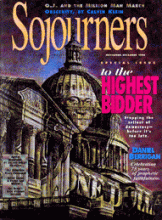Narrow focus on campaign finance reform can blind us to a deeper reality: Democracy is more than elections, even more than government itself.
The notion that democracy is simply a structure of government must be challenged. Our experience and our research convince us that solutions to America's worsening problems will continue to elude us until democracy becomes much more than a structure of government, until it becomes a culture-a culture of participation in decision making.
This is true for at least three reasons.
First, the roots of today's most serious problems-from the environment and education to crime and health care-involve each of us. Solutions involve our attitudes, our behavior, and the values that govern our actions; they are therefore inconceivable unless we ourselves, in large numbers, are motivated to change. For better or worse, most human beings are so motivated when we feel a sense of "ownership" in devising solutions.
Second, there's growing evidence that the best solutions draw on the experience, insights, and creativity of those who contribute their direct experience of the problem-whether it's breast cancer patients guiding doctors on care, people with disabilities designing how public funds can best be used to assist them, or citizens confronted with crack houses coming up with effective strategies while the police continue to fail.
Third, greater participation is necessary to re-form prevailing "public myths"-those large ideas that govern our common life. These myths include the following: Ordinary people don't count much. You can't fight city hall. The rich get richer and the poor get poorer-always have, and always will. We have to choose between the environment and economic security, prosperity and equity. The races can never get along. Democracy is about government. Democratic principles do not belong in business, schools, or the media. Government is the enemy of our well-being. (The share of
Read the Full Article

